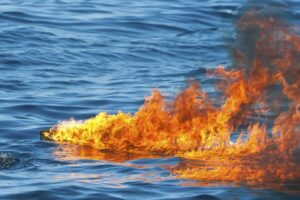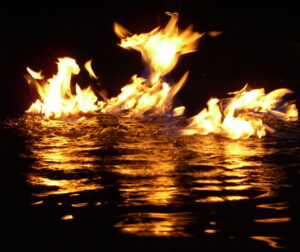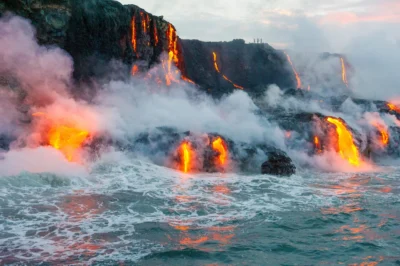Have you ever heard of an ocean on fire? It may sound like a scene straight out of a disaster movie, but believe it or not, it’s a real phenomenon. But how can the ocean be on fire in the first place? And what are the consequences of this terrifying event? Let’s dive into the world of ocean fires and discover the answers to these burning questions.
There are several ways in which the ocean can catch fire. One possible cause is the presence of flammable gases, such as methane or hydrogen sulfide, which can accumulate in the water and ignite if exposed to a spark or flame.
Oil spills can also lead to ocean fires, as the oil floating on the surface of the water can ignite if it comes into contact with a heat source. In addition, lightning strikes have been known to cause ocean fires, as the intense heat of the lightning can ignite flammable gases or oil on the surface of the water.
How can the ocean be on fire?

It is not uncommon for small areas of the ocean surface to catch fire, although this is not the same as the entire ocean being on fire. This can happen when a film of oil on the surface of the water is exposed to heat or sparks, causing the oil to ignite. This can occur naturally, for example, during a lightning storm, or it can be caused by human activities such as an oil spill or the intentional burning of oil on the water.
Another way that the ocean can be “on fire” is through the phenomenon of bioluminescence, which is the production of light by certain marine organisms. This can cause the water to appear to be glowing or “on fire,” especially when the bioluminescence is particularly intense.
Overall, it is important to note that while small areas of the ocean may catch fire, it is not possible for the entire ocean to be on fire due to the vast amount of water and the lack of a sustained fuel source.
What causes the ocean to catch fire?
The ocean can catch fire under certain circumstances, although it is not the same as the entire ocean being engulfed in flames. There are several factors that can cause small areas of the ocean surface to catch fire, including oil spills, natural causes, human activity, and chemical reactions.
Oil spills are one of the most common causes of ocean fires. When oil is spilled into the ocean, it can form a film on the surface of the water. If this oil is exposed to heat or sparks, it can ignite and cause a fire on the surface of the water.
Natural causes, such as lightning, can also cause the ocean to catch fire. Lightning strikes can produce heat and sparks that can ignite a fire on the surface of the water.
Human activity, such as the intentional burning of oil on the surface of the water, can also cause the ocean to catch fire. This can be done for various reasons, such as to burn off excess oil after a spill or to clear debris.
Generally, chemical reactions in the water can sometimes produce heat and cause a fire. This is a rare occurrence, but it can happen when certain chemicals are mixed together and react, releasing heat and potentially igniting a fire on the surface of the water.
Is it possible for the entire ocean to catch fire?
It is not possible for the entire ocean to catch fire. While small areas of the ocean surface may catch fire under certain circumstances, such as due to oil spills or lightning strikes, the vast size of the ocean and the lack of a sustained fuel source would prevent a fire from spreading across the entire body of water.
Additionally, the water in the ocean would itself act as a natural extinguisher, as water is an effective conductor of heat and can help to dissipate the energy that is needed to sustain a fire. As a result, even if a fire were to start in a small area of the ocean, it would quickly be extinguished.
What are the consequences of the ocean being on fire?
It is not possible for the entire ocean to be on fire, as the vast size of the ocean and the lack of a sustained fuel source would prevent a fire from spreading across the entire body of water. However, small areas of the ocean surface can catch fire under certain circumstances, such as due to oil spills or lightning strikes.
If the ocean were to catch fire, it could have serious consequences, including:
- Environmental damage: A fire on the ocean surface could cause environmental damage, such as the destruction of marine life and habitat.
- Pollution: The smoke and pollutants produced by an ocean fire could pollute the air and water, potentially leading to negative health effects for humans and wildlife.
- Economic impacts: An ocean fire could disrupt shipping and other economic activities that rely on the ocean, leading to economic losses.
- Loss of life: A fire on the ocean could pose a serious risk to anyone in the area, potentially leading to loss of life.
Overall, it is important to take steps to prevent ocean fires and to respond quickly and effectively if one does occur in order to minimize the negative consequences.
Can humans prevent the ocean from catching fire?

Yes, humans can take steps to prevent the ocean from catching fire. Here are a few examples:
- Spill prevention: One of the main causes of ocean fires is oil spills, so efforts to prevent spills from occurring in the first place can help reduce the risk of an ocean fire. This can include measures such as properly maintaining and inspecting oil pipelines and vessels and implementing emergency response plans in the event of a spill.
- Fire prevention: Humans can also take steps to prevent fires from starting on the ocean surface due to natural causes or human activity. For example, this could include measures such as avoiding the use of open flames near the water and properly disposing of smoking materials.
- Chemical safety: To prevent chemical reactions in the water from causing a fire, it is important to handle and dispose of chemicals safely and in accordance with relevant regulations.
Just by taking these and other precautions, humans can significantly reduce the risk of the ocean catching fire and minimize the potential consequences if a fire does occur.
What are the dangers of ocean fires?
Ocean fires, also known as marine fires, are fires that occur in the ocean or other bodies of saltwater. They can be caused by a variety of factors, including lightning, human activity, and chemical reactions. While ocean fires are relatively rare, they can have serious consequences for marine life, shipping, and coastal communities.
One of the primary dangers of ocean fires is their impact on marine life. Fires can release toxic fumes and smoke that can be harmful or deadly to fish, birds, and other marine animals. They can also cause physical injury to marine life, as well as damage to their habitats.
In addition to the direct impacts on marine life, ocean fires can also have indirect effects on the marine ecosystem. For example, the smoke and debris produced by ocean fires can block out sunlight and reduce the amount of photosynthesis that occurs in the water, which can have negative impacts on the food chain.
Ocean fires can also pose a threat to shipping and coastal communities. The smoke and flames produced by an ocean fire can make it difficult for ships to navigate, potentially leading to collisions or groundings.
How long do ocean fires last?
The duration of an ocean fire depends on a variety of factors, including the size of the fire, the availability of fuel, and the efforts made to extinguish it. Some ocean fires may burn for only a short period of time, while others may burn for days, weeks, or even longer.
For example, a small fire that is ignited by a lightning strike and burns a limited area of surface vegetation may be extinguished quickly, perhaps within a few hours. On the other hand, a large fire that is fueled by an oil spill or other flammable material may burn for an extended period of time, potentially lasting for days or even weeks.
In cases where ocean fires are caused by human activity, such as the burning of debris or the ignition of an oil spill, efforts may be made to extinguish the fire. These efforts may involve the use of water, foam, or other fire-suppressing agents. The effectiveness of these efforts will depend on the specific circumstances of the fire and the resources available to respond to it.
Furthermore, the duration of an ocean fire is difficult to predict and can vary significantly depending on the factors involved.
Can ocean fires be controlled?
Ocean fires, also known as marine fires or sea fires, are rare but potentially dangerous events that occur when the surface of the ocean ignites. These fires can be caused by a variety of factors, including lightning strikes, chemical spills, and natural gas seeps.
While it is possible to control ocean fires, doing so can be challenging due to the harsh and unpredictable conditions of the marine environment.
Here are a few methods that have been used to control ocean fires:
- Cooling: One of the most effective ways to control an ocean fire is to cool the burning fuel. This can be done by spraying the fire with water, using fire-retardant chemicals, or applying the foam.
- Smothering: Another approach to controlling an ocean fire is to smother the flames by depriving them of oxygen. This can be done by using a blanket of foam or by sealing off the burning area with a barrier.
- Isolation: In some cases, it may be possible to isolate the burning area by creating a barrier around it. This can prevent the fire from spreading and give responders time to work on extinguishing it.
- Dispersants: In the event of an oil spill, chemical dispersants can be used to break up the oil into small droplets that are more easily degraded by natural processes. This can help to prevent a fire from starting or spreading.
- Evacuation: In some cases, it may be necessary to evacuate the area around an ocean fire to ensure the safety of people and wildlife. This can be a challenging task, particularly in remote or difficult-to-access areas.
How do ocean fires compare to other types of fires?

Ocean fires, also known as marine fires, are fires that occur on the surface of the ocean. They can be caused by lightning, human activity, or natural causes such as spontaneous combustion.
Also, ocean fires are generally less intense and shorter-lived than other types of fires because of the high humidity and the presence of saltwater, which can inhibit combustion.
Other types of fires include:
- Structural fires: fires that occur in buildings, homes, or other structures
- Wildfires: fires that occur in natural areas, such as forests, grasslands, or wetlands
- Industrial fires: fires that occur in factories, warehouses, or other industrial settings
- Vehicle fires: fires that occur in vehicles, such as cars, trucks, or airplanes
- Outdoor fires: fires that occur in outdoor spaces, such as bonfires or barbeques
- Kitchen fires: fires that occur in kitchens, often as a result of cooking accidents
- Electrical fires: fires that are caused by electrical malfunctions or problems with wiring.
It is important to understand the differences between these types of fires, as each type of fire requires a different approach to fire suppression and prevention.
Can ocean fires be used for any beneficial purposes?
It is not common for ocean fires to be intentionally set or used for beneficial purposes. In general, fires on the surface of the ocean can be dangerous and destructive, as they can spread quickly and threaten the safety of ships and individuals in the area.
However, some researchers have suggested that controlled ocean fires could potentially be used as a tool for environmental management. For example, it has been suggested that carefully controlled ocean fires could be used to remove oil slicks from the surface of the water or to clear debris from shipping lanes.
It is important to note that these are just theoretical suggestions, and it is not currently feasible to use ocean fires in this way. Further research and development would be needed before controlled ocean fires could be used for any beneficial purposes.
Recommended:
How do ocean fires affect the climate?
Fires, including ocean fires, can have an impact on the climate through the release of gases and particles into the atmosphere. When a fire burns, it releases gases such as carbon dioxide, water vapor, and nitrogen oxides into the air.
These gases can contribute to climate change by trapping heat in the atmosphere and increasing the greenhouse effect.
Ocean fires are generally less intense and shorter-lived than other types of fires, so they are likely to have a smaller overall impact on the climate compared to other types of fires. However, the exact impact of ocean fires on the climate will depend on the size and intensity of the fire, as well as the type of material that is burning.
In addition to the release of gases, fires can also generate particles, such as soot and ash, which can be transported by winds and deposited in other parts of the world. These particles can absorb or reflect sunlight, which can affect the Earth’s energy balance and climate.
Furthermore, the impact of ocean fires on the climate is likely to be relatively small compared to other sources of greenhouse gas emissions, such as the burning of fossil fuels. However, it is still important to consider the potential climate impacts of all types of fires and to take steps to reduce the occurrence and severity of fires where possible.
Conclusion
If you need information on how can the ocean be on fire, then you are just in the right place. It is not possible for the ocean to be on fire in the traditional sense, as fire requires oxygen, and the ocean is a body of water. However, there are certain conditions and substances that can cause the ocean to appear as if it is on fire.

